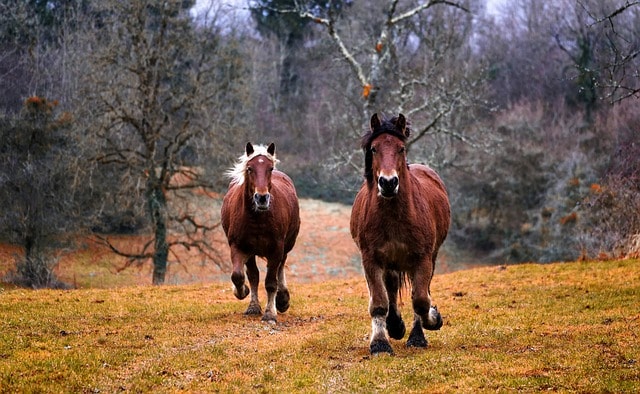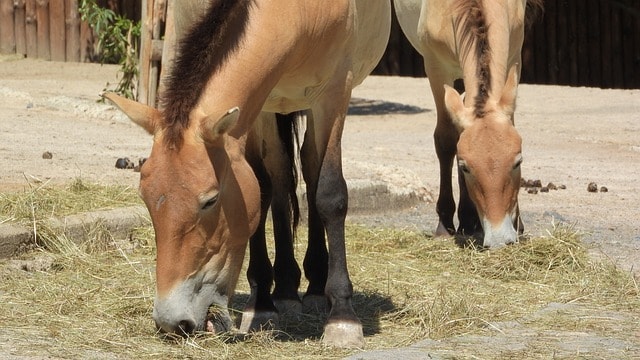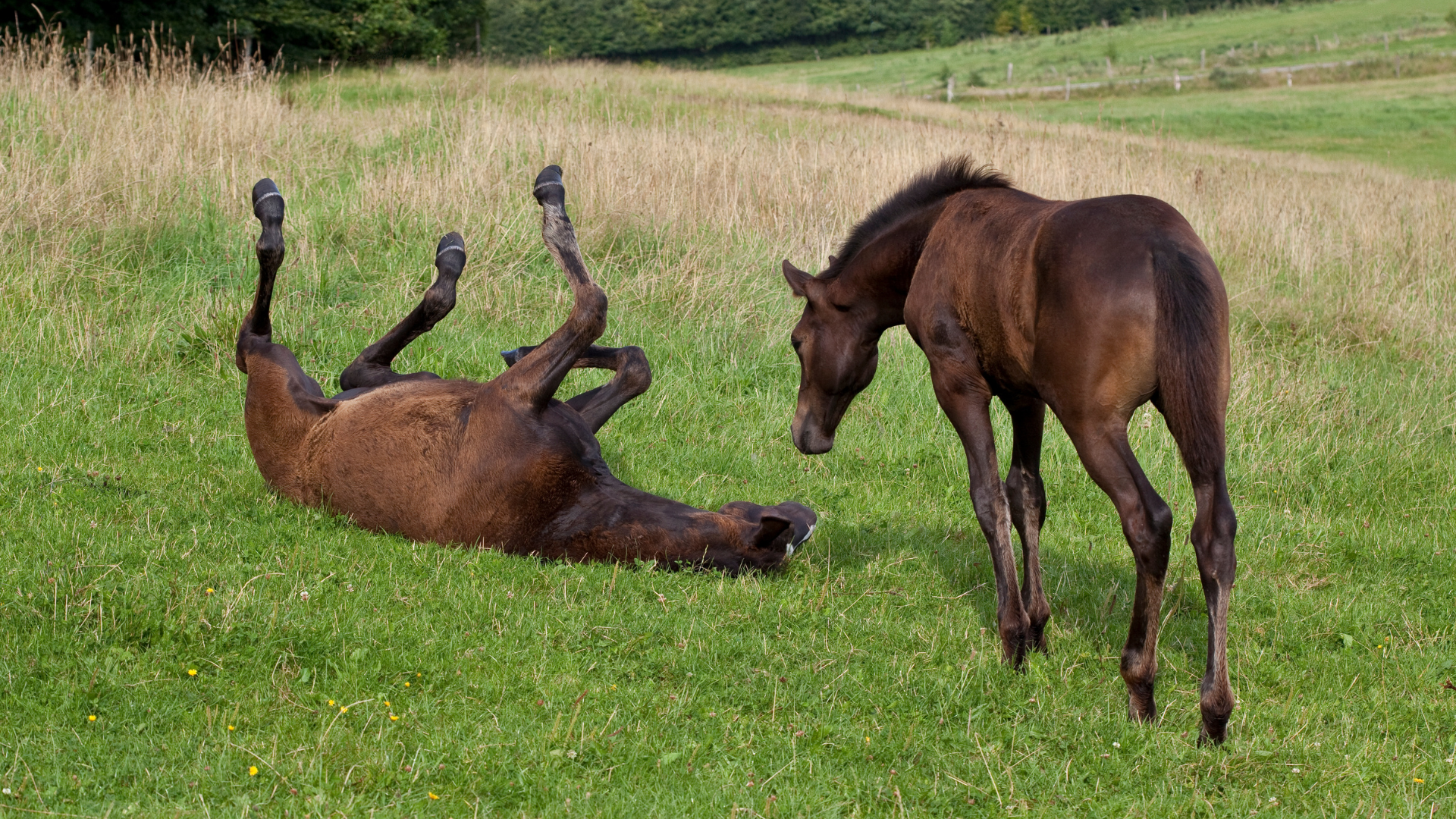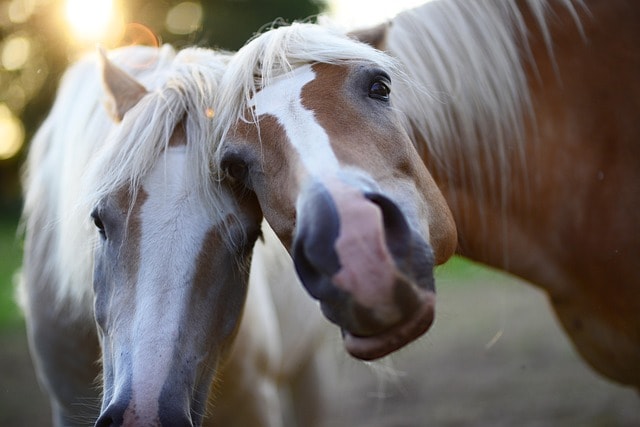The horse's immune system: How you can strengthen it
Spring is here and the joy of finally being able to go riding and enjoy the pasture again is great.
But spring also brings challenges for your horse's health. Temperature fluctuations in the transition period in particular can put a lot of strain on the horse's immune system and make horses more susceptible to infections and diseases.
A strong and well-functioning immune system is crucial for your horse to remain healthy and vital. In this article, you will learn everything you need to know about how to strengthen it sustainably - from the right feeding to the targeted administration of vitamins and trace elements to measures to avoid stress.

Why is the horse's immune system so important?
It is the body's defense system and protects against harmful influences such as viruses, bacteria and parasites. It ensures that pathogens are repelled or fought before they can cause major damage. In addition, a strong immune system helps to repair damaged cells and maintain healthy body functions.
The most important functions of the immune system in horses:
-
Protection against pathogens : The immune system recognizes and fights harmful bacteria, viruses, fungi and parasites.
-
Cell repair : Damaged cells are detected and eliminated to prevent infections.
-
Wound healing : A strong immune system supports the healing process after injuries and ensures a quick recovery.
In order to fulfil these tasks, the immune system consists of various components. The body's most important defence mechanisms include the skin, mucous membranes, the blood and lymphatic systems and the intestines. The intestines in particular play a central role in the horse's defence system.
The horse intestine as a key to the immune system
Did you know that up to 80 percent of your horse's immune cells are located in its intestines? The intestines are not only responsible for digestion, but also an important part of the immune system. A healthy intestinal flora is crucial for fighting off harmful microorganisms and effectively absorbing nutrients.
Functions of the intestine in the immune system:
-
Production of antibodies : The so-called lymphocytes are immune cells that are produced in the intestine and neutralize pathogens.
-
Maintaining intestinal flora : A healthy intestinal flora consists of “good” bacteria and fungi that maintain balance in the intestine and prevent harmful organisms from taking over.
-
Barrier function : The intestine forms a natural barrier against harmful substances and prevents them from entering the bloodstream.
Since the intestine is so closely linked to the immune system, a disturbed intestinal flora has a negative effect on the horse's defenses. A balanced diet and the right feeding are therefore essential to support the immune system.
How do you recognize a weakened immune system in horses?
A weakened immune system can manifest itself in different ways. Your horse often shows signs of exhaustion, is more susceptible to illness or suffers from skin problems. Here are some typical symptoms that indicate a weak immune system:
Common signs of a weakened immune system in horses:
-
Lethargy and exhaustion : If your horse has less energy than usual and is less lively, this could be a sign of a weak immune system.
-
Skin problems : Eczema, hair loss or skin irritations often occur when the immune system is weakened because the skin is no longer able to adequately fend off harmful influences.
-
Increased susceptibility to infections : If horses get sick more often or recover more slowly from illnesses, this is a clear sign that their immune system is weakened.
-
Digestive problems : Impaired intestinal function can manifest itself in the form of diarrhea, constipation or flatulence and also weakens the immune system.
If you observe one or more of these symptoms in your horse, you should take measures to strengthen the immune system and restore your horse's health.
Strengthening the immune system: Proper feeding as the basis of horse nutrition
A balanced and healthy diet is the first step to supporting your horse's immune system. Horses depend on roughage such as hay and grass, which not only stimulates their digestion but also provides important nutrients that strengthen the immune system.
Roughage: The foundation of horse feeding
High-quality roughage is the basis for a healthy immune system. It supplies the intestines with important fiber, which supports the "good" bacteria in the intestines and keeps the intestinal flora in balance. Make sure that your horse gets enough hay or straw every day, as these food sources are particularly rich in fiber.
-
Hay : Hay is the most important source of roughage for horses and should be available in sufficient quantities every day. It promotes digestion and supplies the body with important nutrients.
-
Grass : Fresh grass also provides valuable nutrients and is a good addition to the feed, especially during the grazing season. Make sure that your horse gets used to the fresh green grass slowly to avoid digestive problems.

Concentrated feed as a supplement to daily feeding
In addition to roughage, special supplementary feed can also be useful to strengthen your horse's immune system. Concentrated feed can help to cover nutritional needs, especially in phases of increased stress, such as during the coat change or in stressful situations.
-
Mineral feed : Mineral feed contains important vitamins and trace elements that are necessary for the immune system. It should be regularly integrated into the diet to prevent deficiency symptoms.
-
Dietary supplements : In times of increased stress, the administration of special dietary supplements can be useful. These include probiotics and prebiotics, which strengthen the intestinal flora and support the immune system.
Make sure that the feeding is tailored to your horse's individual needs. Not every horse needs the same amount of feed or nutritional supplements. Consulting a veterinarian or feed expert can help you create the optimal feeding plan.
Vitamins and trace elements for a strong horse immune system
Vitamins and trace elements are essential for your horse's immune system. They support the immune system and ensure that the body can maintain all important functions. Many of these nutrients can be obtained through feeding, but in some cases nutritional supplements are necessary to avoid deficiencies.
Important vitamins for the horse’s immune system:
-
Vitamin C : Vitamin C is a powerful antioxidant that neutralizes free radicals and strengthens the immune system. It helps fight infections and promotes wound healing.
-
Vitamin E : Vitamin E supports muscle function and also acts as an antioxidant that protects cells and strengthens the immune system.
-
Vitamin A : This vitamin is important for mucous membranes and skin health. It helps maintain the body's barrier function and protects against infections.
-
Vitamin D : Vitamin D is important for bone health and the immune system. It supports the absorption of calcium and strengthens the immune system.
Trace elements and minerals:
-
Zinc : Zinc plays a central role in wound healing, skin health and immune function. A zinc deficiency can lead to skin problems and a weakened immune system. The need for zinc is particularly high during the shedding period.
-
Selenium : Selenium is another antioxidant that neutralizes free radicals and protects cells. It supports the immune system and muscle function.
-
Magnesium : Magnesium is important for muscle function and helps reduce stress. Since stress can weaken the immune system, adequate magnesium intake is crucial.
If your horse does not get enough of these important vitamins and minerals through its diet, you can offer it supplementary feed. You can find a range of suitable products in our online shop . However, make sure you choose the right dosage, as an excess of certain nutrients can have negative effects.
Herbs can also help strengthen the horse's immune system. Certain herbs such as echinacea, thyme and ginger are considered natural helpers for the horse's immune system. These plants are said to have anti-inflammatory properties and actively support the body's own defenses.
When using herbs, it is crucial to ensure that they are of high quality and come from a safe source. They should also be gradually and carefully integrated into your horse's diet.
Reduce stress: An important factor for a strong immune system in horses
Stress is one of the greatest enemies of the immune system. When horses are under constant stress, their immune system is weakened and the risk of infections and diseases increases. Stress can be triggered by various factors, such as changing stables, transport, visits to the vet or intensive training sessions. Extreme environmental influences such as cold, heat or constant rain can also affect your horse and strain its immune system.
Tips for reducing stress in horses:
-
Sufficient exercise : Horses are flight animals and need daily exercise to reduce stress and promote their health. Regular rides or walks on pasture help to stimulate the circulation and strengthen the immune system.
-
Appropriate housing : Appropriate housing is crucial for the well-being of your horse. Make sure that your horse has enough space to move around and that it lives in a quiet and stress-free environment.
-
Social contacts : Horses are herd animals and feel most comfortable in the company of other horses. Make sure that your horse has regular contact with other horses to avoid boredom and isolation.
-
Avoid overexertion : Intensive training sessions or competitions can quickly overexert your horse and lead to a stressed state. Plan the training so that your horse has enough breaks and is not overexerted.
By minimizing sources of stress and providing your horse with a species-appropriate environment, you support its immune system and ensure a healthy and balanced life.

measures to improve environmental conditions
The environment in which your horse lives plays a crucial role in its health and well-being. A clean and hygienic environment helps reduce the risk of infections and diseases.
Hygiene in the stable:
-
Clean stables : The stable should be cleaned regularly to prevent the accumulation of dirt and pathogens. Thorough cleaning is especially important in winter when the horses spend more time in the stable.
-
Fresh bedding : Clean and dry bedding keeps your horse comfortable and reduces the risk of skin infections. Make sure that the bedding is changed regularly.
-
Ventilation : Good ventilation in the barn is crucial to improve air quality and prevent respiratory diseases. Make sure the barn receives sufficient fresh air without creating drafts.
Conclusion: How to strengthen your horse's immune system for a long and healthy life
Your horse's immune system is a complex network that works tirelessly to protect the body from harmful influences such as pathogens, stress and environmental influences.
A key component for a strong immune system is proper feeding. High-quality roughage, such as hay and grass, forms the basis for stable health by promoting digestion and providing essential nutrients.
Vitamins, trace elements and minerals also play a key role. Zinc, selenium, vitamin C and E in particular are essential to strengthen your horse's immune system and support its ability to regenerate. Make sure that your horse is adequately supplied with these micronutrients, either through a balanced diet or targeted nutritional supplements.
Since up to 80 percent of immune cells are located in the intestines, a healthy intestinal flora is essential. The right diet and high-quality probiotics promote the balance of "good" bacteria and help the immune system to function optimally. A stable intestine not only protects against digestive problems, but also against harmful invaders.
Stress is an often underestimated factor that can put a significant strain on the immune system. External influences such as changing stables, transport or intensive training can quickly throw the immune system out of balance. Therefore, make sure to avoid stressful situations as much as possible and give your horse enough rest and relaxation. Regular exercise, social contact with other horses and species-appropriate housing are also essential for reducing stress and strengthening the immune system.
Environmental conditions also play an important role. A clean and well-ventilated stable, regular hygiene and fresh bedding help to ensure that your horse feels comfortable and is protected from pathogens. Good air quality and hygiene in the stable prevent respiratory diseases and skin infections, which could put additional strain on the immune system.
In summary, you should take a holistic approach to strengthen your horse's immune system as much as possible. Proper feeding, targeted nutrient intake, stress-free living conditions and a clean environment are the essential building blocks for a strong and resilient immune system. If you keep an eye on these factors and look after your horse well, you will create the best conditions for your four-legged friend to remain healthy, vital and full of energy - not just in spring, but all year round.
With good care and a strong immune system, nothing stands in the way of your horse living a long and happy life.













